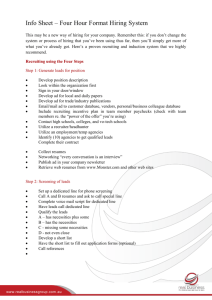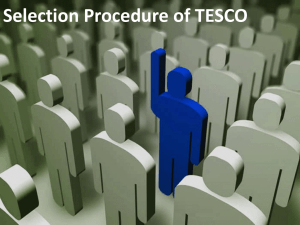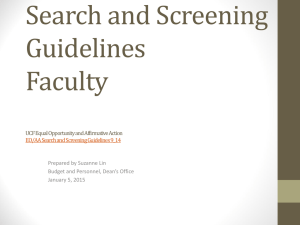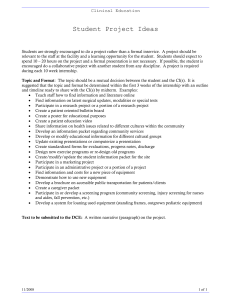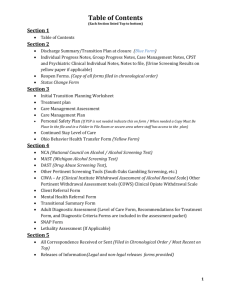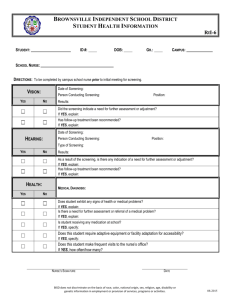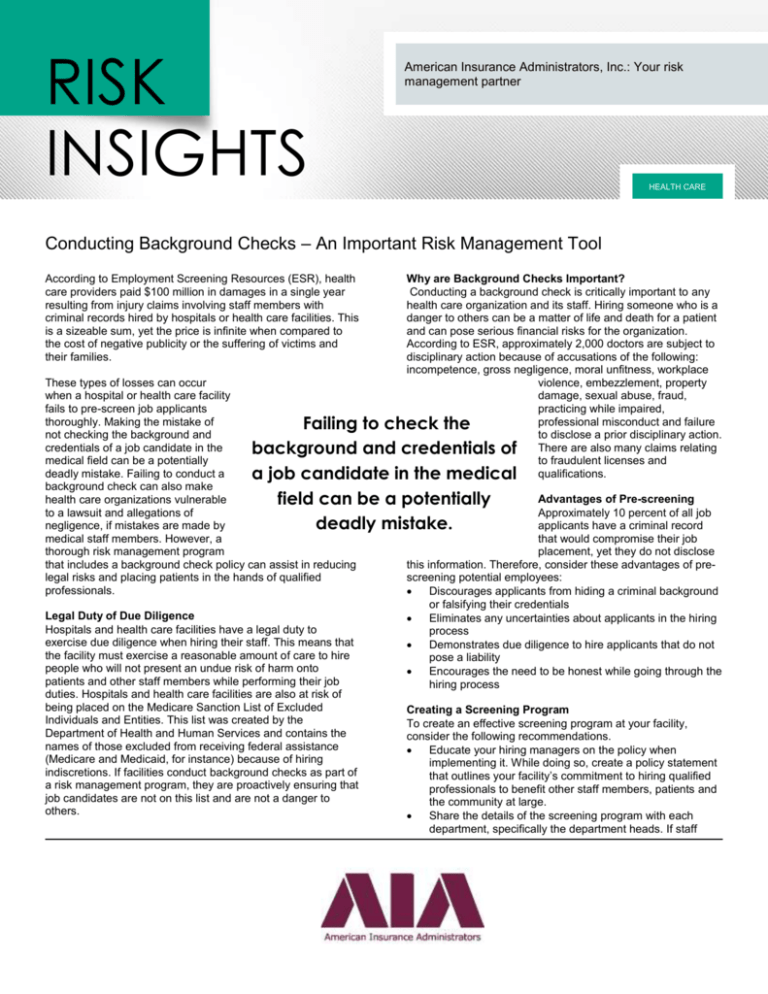
RISK
INSIGHTS
American Insurance Administrators, Inc.: Your risk
management partner
HEALTH CARE
Conducting Background Checks – An Important Risk Management Tool
Why are Background Checks Important?
Conducting a background check is critically important to any
health care organization and its staff. Hiring someone who is a
danger to others can be a matter of life and death for a patient
and can pose serious financial risks for the organization.
According to ESR, approximately 2,000 doctors are subject to
disciplinary action because of accusations of the following:
incompetence, gross negligence, moral unfitness, workplace
violence, embezzlement, property
damage, sexual abuse, fraud,
practicing while impaired,
professional misconduct and failure
Failing to check the
to disclose a prior disciplinary action.
background and credentials of There are also many claims relating
to fraudulent licenses and
a job candidate in the medical qualifications.
According to Employment Screening Resources (ESR), health
care providers paid $100 million in damages in a single year
resulting from injury claims involving staff members with
criminal records hired by hospitals or health care facilities. This
is a sizeable sum, yet the price is infinite when compared to
the cost of negative publicity or the suffering of victims and
their families.
These types of losses can occur
when a hospital or health care facility
fails to pre-screen job applicants
thoroughly. Making the mistake of
not checking the background and
credentials of a job candidate in the
medical field can be a potentially
deadly mistake. Failing to conduct a
background check can also make
Advantages of Pre-screening
health care organizations vulnerable
field can be a potentially
to a lawsuit and allegations of
Approximately 10 percent of all job
negligence, if mistakes are made by
deadly mistake.
applicants have a criminal record
medical staff members. However, a
that would compromise their job
thorough risk management program
placement, yet they do not disclose
that includes a background check policy can assist in reducing
this information. Therefore, consider these advantages of prelegal risks and placing patients in the hands of qualified
screening potential employees:
professionals.
Discourages applicants from hiding a criminal background
or falsifying their credentials
Legal Duty of Due Diligence
Eliminates any uncertainties about applicants in the hiring
Hospitals and health care facilities have a legal duty to
process
exercise due diligence when hiring their staff. This means that
Demonstrates due diligence to hire applicants that do not
the facility must exercise a reasonable amount of care to hire
pose a liability
people who will not present an undue risk of harm onto
Encourages the need to be honest while going through the
patients and other staff members while performing their job
hiring process
duties. Hospitals and health care facilities are also at risk of
being placed on the Medicare Sanction List of Excluded
Creating a Screening Program
Individuals and Entities. This list was created by the
To create an effective screening program at your facility,
Department of Health and Human Services and contains the
consider the following recommendations.
names of those excluded from receiving federal assistance
Educate your hiring managers on the policy when
(Medicare and Medicaid, for instance) because of hiring
implementing it. While doing so, create a policy statement
indiscretions. If facilities conduct background checks as part of
that outlines your facility’s commitment to hiring qualified
a risk management program, they are proactively ensuring that
professionals to benefit other staff members, patients and
job candidates are not on this list and are not a danger to
the community at large.
others.
Share the details of the screening program with each
department, specifically the department heads. If staff
RISK INSIGHTS
HEALTH CARE
members understand the program, they are more likely to
assist with the process to make it more successful.
Determine the level of screening that is appropriate for
each position. The screening should vary, but should
remain consistent between similar positions. For instance,
a hospital does not need to screen as intensely for their
janitorial staff as they would for a doctor because there are
less risks involved in a janitor’s job duties.
Determine which parts of the screening process should be
done in-house and what needs to be completed by a
professional screening organization. This will depend on
your facility’s resources. For many screening tasks, such
as criminal background checks, using an outside
organization is more cost-effective and thorough.
Select an outside professional screening organization to
assist in the hiring process. Consider the following for
each organization before selecting one to assist your
facility:
Level of expertise in the screening arena and your field
specifically.
Understanding of legal compliance during the prescreening and hiring process.
Level of personal service to your facility and ability to
assist your HR department with hiring tasks.
Ability to help train new hires.
Familiarity with the health care field.
Possesses a solid performance guarantee that screening
and reports will be done promptly.
Create customized forms to attach to each application for
the pre-screening process.
Designate a staff member to be in charge of the process
and to help select candidates from a large pool of
applicants to move on to pre-screening. This person is
also in charge of assisting when the screening process
reveals negative results regarding potential job
candidates.
Recommended Screenings
Once an organization has deemed that a job candidate could
potentially be a good fit for a position, the pre-screening
process can begin. Since pre-employment screening is
governed by the Fair Credit Reporting Act (FCRA), applicants
must sign a written consent form outlining that the health care
facility or a third party may investigate his/her background.
Therefore, if any negative information is found, the applicant
will receive a copy of the report, along with a statement of their
rights. This gives the applicant the opportunity to object, in
case the information is not accurate.
Typically, a hospital or health care facility would screen
candidates in two areas: medical credentials and general due
diligence background information relating to the position. In
addition, contact professional references, verify clinical activity
for the previous few months, etc.
The following information outlines the sources of background
information, the reason(s) to obtain this information and where
it can be found for medical personnel.
Credentials
o Used to verify information relating to the
candidate’s credentials. Look at a physician
credential’s report including:
Candidate’s full name
Date of birth
Gender
Current practice location
Educational background
State in which the physician is licensed
Honors and specialty certificates
Determine whether sanctions have been
imposed on him/her by the DEA, FDA or
Department of Health and Human
Services
Records concerning disciplinary action
from the 67 State Medical and
Osteopathic Boards (covers every state
in the United States.)
Background screening information and records
o Used to conduct a due diligence search.
o Investigate the following information:
Criminal check of the state courts for
felonies and misdemeanors.
Search of government databases for
outstanding criminal warrants
throughout the U.S.
Search of upper level civil courts to
reveal any suits or judgments.
Search of the federal district court
(criminal and civil) where the candidate
has lived, worked or studied.
Look at a credit report to uncover past
addresses, past employment, liens,
bankruptcies and judgments.
Look at a state driving record to identify
any substance abuse violations.
Additional Information
o Supplements credential information.
o Investigate the following information:
Educational background
Employment background and
verification
References
For assistance on how to protect your organization when hiring
new staff, consult your legal counsel. To learn more about
insuring your facility and its staff members, contact us today at
717-591-8280.
This Risk Insights is not intended to be exhaustive nor should any discussion or opinions be construed as legal advice. Readers should contact legal counsel or an insurance
professional for appropriate advice. Content © 2007-2010 Zywave, Inc. All rights reserved.

